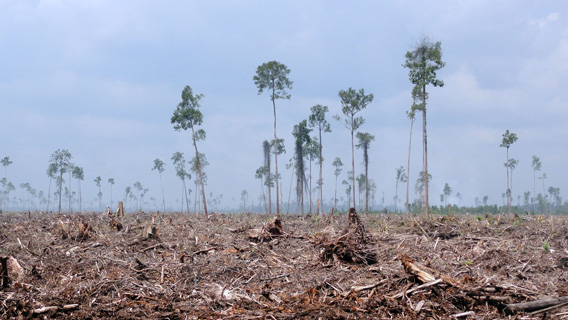
Peat draining and large-scale clearance of natural forest by APP wood supplier PT. Ruas Utama Jaya. Eyes of the Forest said the clearing occurred inside APP’s Senepis Tiger Sanctuary, but the paper giant says the clearing is in an area that was allocated for conversion — and signed off by the Indonesian government — in 2008. APP claims the Senepis Tiger Sanctuary — more than 85 percent of which belongs to another company — remains intact. © Eyes of the Forest / WWF-Indonesia
American consumers are unwittingly contributing to the destruction of endangered rainforests in Sumatra by purchasing certain brands of toilet paper, asserts a new report published by the environmental group WWF.
The report, Don’t Flush Tiger Forests: Toilet Paper, U.S. Supermarkets, and the Destruction of Indonesia’s Last Tiger Habitats, takes aim at two tissue brands that source fiber from Asia Pulp & Paper (APP), a paper products giant long criticized by environmentalists and scientists for its forestry practices on the Indonesian island of Sumatra. The brands — Paseo and Livi — are among the fastest growing, in terms of sales, in the United States. Both brands are commonly marketed for hotels, restaurants, and public restrooms, according to the report.
APP has converted large tracts of Sumatran rainforest for wood-pulp plantations used to produce fiber for paper products. The forests serve as critical habitat for a range of endangered species and generate livelihood for rural communities.
“APP is rapidly expanding into the U.S. market with paper products linked to rain forest destruction, originating from areas that are the last home for critically endangered Sumatran tigers, elephants, and orangutans,” states the WWF report.
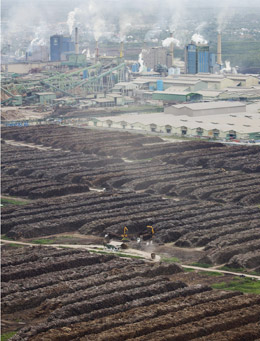
|
WWF estimates that APP has destroyed nearly 5 million hectares of forest in Sumatra since it began operations in 1984. APP is still heavily dependent on sourcing fiber from natural forests, a consequence of “historically low investment in plantation development and a strong reliance on plantations located on peat soils and in areas with community conflict,” according to the report.
APP has missed three self-imposed targets for phasing out rainforest fiber from its supply chain, raising concerns that its plan to nearly double processing capacity by 2016 could take an ever-greater toll on Sumatra’s increasingly rare lowland forests.
In the United States, APP distributes and markets its products through several North America-based subsidiaries and affiliates, including Mercury Paper, Solaris Paper, Papermax, Global Paper Solutions and Eagle Ridge Paper. Criticism over APP’s forestry practices, which has prompted several major retailers to stop carrying APP products, is now affecting the bottom line some of these companies.
In recent weeks, Mercury Paper has launched a campaign to try to persuade Kroger — one of its biggest customers — to again carry Paseo brand products. The campaign is supported by the Consumer Alliance for Global Prosperity (CAGP), a group that advocates on behalf of APP interests in the United States (it claims no affiliation), and has even recruited Virginia Governor Bob McDonnell to write a letter on Mercury’s behalf. The letter warned that Mercury Paper’s declining fortunes could affect some of the 150 jobs the company says it created when it moved its headquarters to Strasburg, Virginia.
But WWF rejected Mercury’s claims that environmental concerns are undermining American jobs. Its report noted that the Department of Commerce recently ruled against APP, imposing anti-dumping and countervailing duties for “dumping” paper on the U.S. market at “artificially low prices” and “threatening U.S. jobs and U.S. industry ‘with material injury by reason of less-than-fair-value imports of certain coated paper from Indonesia.'” Since the ruling, APP has stepped up its public relations in the United States, while at the same time groups like Consumer Alliance for Global Prosperity and the Coalition to Protect Virginia Jobs have emerged. These groups, which align themselves with the Tea Party movement, criticize companies that have stopped carrying APP products and campaign against WWF and Greenpeace, both of which are pressuring APP.
WWF says its concerns about APP aren’t political.
“This isn’t a political issue – it’s about making US consumers aware of where their toilet paper comes from, so that they can make informed decisions about the sources of the products they buy,” Linda Kramme, a WWF forest expert, told mongabay.com. “We’re not trying to put Mercury or APP out of business – we’re simply asking that they adhere to the same responsible forestry practices that pulp and paper companies the world over adhere to.”
For its part, APP says it operates within the confines of Indonesian law and avoids the conversion of high conservation value forest. The paper giant adds that its products are certified by independent auditors, while its advertisements tout various conservation initiatives as a sign of its commitment to sustainability.
“Mercury Paper has demonstrated its sound environmental policies and practices to officials in the Commonwealth of Virginia over the years, clearly showcasing that Mercury’s products are manufactured from sustainable and environmentally responsible sources,” an APP spokesperson told mongabay.com. “APP tissue products have achieved many independently audited, international certifications for sustainability.”
“Our products’ key credentials include: PEFC certified NBKP (long fiber) [and] legally verified and certified LBKP (short fiber) obtained from sustainably managed rapidly renewable plantation fiber. The certifications include non-controversial sources under PEFC guidelines, LEI, and PHPL sustainable management forest standard.”
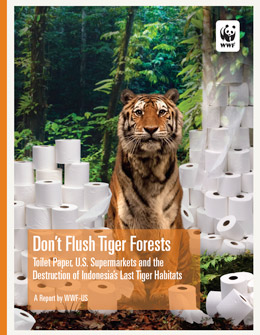 Don’t Flush Tiger Forests |
But environmental groups, including WWF, cast doubt on some of these claims. Recent reports by Indonesian groups Eyes on the Forest (a WWF partner) and Greenomics question whether APP’s conservation projects really go above-and-beyond what is required under Indonesian law, while Greenpeace and the Rainforest Action Network have both found rainforest fiber in packaging materials produced by APP, according to independent testing lab results. In fact, another NGO, the Rainforest Alliance terminated its high conservation value forest assessment work for APP when it found the paper giant to be breaking its commitment to protecting key habitats. The Forest Stewardship Council, which has the most rigorous certification criteria among the major wood products standards, has even barred APP.
“The bottom line is that Mercury Paper’s products are made from APP fiber – and APP’s forestry practices are wiping out Sumatra’s forests,” said WWF’s Kramme. “Right now, APP’s forest management operations in Indonesia are not certified as sustainable by any credible third party. Hundreds of responsible pulp and paper companies all over the world operate without destroying natural forest. Until APP cleans up their act, tigers, elephants and orangutans will continue to be in danger due to habitat loss.”
The WWF report also cites the climate impacts of APP’s operations. It notes that 2006 research showed that emissions from APP’s Indonesian pulp and paper mills and wood supply operations amount to 67 million to 86 million tons of carbon dioxide, or more than the emissions of 165 countries. It adds that APP’s climate impact is likely to worsen.
“With so much of the easily accessible dry forests gone, much of APP’s future forest clearance is planned in areas with deep peat, which will cause the peat’s stored carbon to be further released, dramatically increasing APP’s already substantial contribution to global climate change.”
Given these concerns, WWF ends its report for a call to companies and consumers in North America to avoid APP products. It says market pressure is the only way to get APP commit to meaningful reform.
“Commercial purchasing power can drive improved forestry,” states the report. “Companies can avoid risks and influence responsible forestry practices in Indonesia and elsewhere by choosing responsible paper products as part of their individual purchasing decisions.”
|
UPDATE Feb 10, 2012: APP’s response: We take deforestation criticism ‘seriously’ On the heels of WWF’s report linking its products to deforestation in Sumatra, on Thursday Asia Pulp & Paper (APP) issued a statement saying it takes environmental concerns “seriously” and is implementing changes to reduce the impact of its operations. “The issues that WWF raise in the report are important and we take them seriously in our organization. We agree with WWF that consumers should not have to choose between tigers and toilet paper, and that companies like APP play a crucial role in ensuring that Americans have a choice of high quality, sustainably sourced paper products,” Aida Greenbury, APP’s managing director of sustainability and stakeholder relations, said in a statement. APP said conserving the biodiversity of Indonesia’s forests is part of its responsibility and it would work toward ensuring its “supply chain partners act in accordance with our sustainability values” “We are implementing these changes now but require time as it involves multi-stakeholder collaboration,” said Greenbury. “We commit to transparently reporting on our program in implementing these actions.” |
Related articles
More big companies disclosing impacts on forests

(02/07/2012) More companies are reporting on the impact of their operations on global forests, finds a new report. Eighty-seven global corporations disclosed their “forest footprint” in 2011, according to the third Forest Footprint Disclosure (FFD), which asks companies to report on their impact on forests based on their use of five commodities: soy, palm oil, timber and pulp, cattle, and biofuels. This is a 11 percent rise from the companies that reported in 2010, including the first reports by companies such as the Walt Disney Company, Tesco UK, and Johnson & Johnson. However a number of so-called “green” companies continue to refuse to disclose, including Patagonia, Stonyfield Farms, and Whole Foods Markets Inc.
Sumatran elephant population plunges; WWF calls for moratorium on deforestation
(01/24/2012) The Sumatran elephant subspecies (Elephas maximus sumatranus) was downgraded to critically endangered on IUCN’s Red List of Threatened Species on Tuesday, prompting environmental group WWF to call for an immediate moratorium on destruction of its rainforest habitat, which is being rapidly lost to oil palm estates, timber plantations for pulp and paper production, and agricultural use.
WWF: Asia Pulp & Paper misleads public about its role in destroying Indonesia’s rainforests
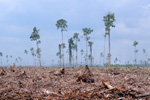
(12/16/2011) Asia Pulp & Paper (APP) continues to mislead the public about its role in destroying rainforests and critical tiger habitat across the Indonesian island of Sumatra, alleges a new report from Eyes on the Forest, a coalition of Indonesian environmental groups including WWF-Indonesia. The report, titled The truth behind APP’s Greenwash, is based on analysis of satellite imagery as well as public and private documentation of forest cleared by logging companies that supply APP, which is owned by the Indonesian conglomerate, Sinar Mas Group (SMG). The report concludes APP’s fiber suppliers have destroyed 2 million hectares of forest in Sumatra since 1984.
Paper commitments for the Indonesian industry

(12/13/2011) The Indonesian group Asia Pulp & Paper (APP) has been the target of many NGOs for years due to its alleged negative impacts on tropical forests. This culminated in a spectacular campaign launched by Greenpeace in 2011 based on Ken “dumping” Barbie. The rationale was that toy brand Mattel was accused of using APP paper products linked to the clear-cutting of natural forests in the Indonesian archipelago. APP organized a counter-attack in the media with the daily publication of advertisements promoting its sustainable development practices. Journalists from all over the world were also invited to attend guided tours of APP concessions to demonstrate their conservation efforts, and a number of articles were subsequently written.
War of words between Greenpeace, Asia Pulp & Paper over deforestation allegations
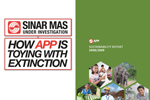
(11/16/2011) Greenpeace and Asia Pulp & Paper (APP), a giant global paper supplier, are locked in a heated battle over the activist group’s allegations that APP products contain fiber sourced from the destruction of forests in Indonesia. At stake is APP’s access to some of the world’s most lucrative markets. Until APP provides solid evidence refuting Greenpeace’s accusation that its pulp and paper production isn’t coming at the expense of natural forests in Indonesia, APP will have a difficult time winning over critics.
Paper suppliers risk damaging Indonesia’s reputation, argues report
(10/07/2011) Indonesia needs to re-evaluate forest areas and peatlands granted for pulp and paper plantations to reduce the risk of damaging the international reputation of its forest products and undermining its commitment to greenhouse gas emissions reductions, argues a new report published by an Indonesian activist group.

(07/27/2011) Indonesia’s forests were cleared at a rate of 1.5 million hectares per year between 2000 and 2009, reports a new satellite-based assessment by Forest Watch Indonesia (FWI), an NGO. Expansion of oil palm and wood-pulp plantations were the biggest drivers of deforestation, yet account for a declining share of the national economy. The study, which compared year 2000 data with 2009 Landsat images from NASA, found that Indonesia’s forest cover declined from 103.32 million hectares to 88.17 million hectares in ten years. Since 1950 Indonesia lost more than 46 percent of its forests.
Barbie, Legos, other toys linked to destruction of Indonesia’s rainforests

(06/07/2011) Some of the world’s largest and most prominent toy-makers are sourcing their packaging materials from companies linked to large-scale destruction of Indonesia’s rainforests, alleges a new report from Greenpeace. The report, How APP is Toying with Extinction, is based on forensic analysis of toy packaging from Mattel, which manufacturers Barbie and Hot Wheels toys; Disney, which makes a variety of toys linked to its movies; Hasbro, which produces GI Joe, Star Wars, and Sesame Street toys and various games like Monopoly and Scrabble; and Lego, which makes the iconic plastic building blocks. The analysis found traces of mixed-tropical hardwood (MTH) and acacia fiber which are principally sourced from Asia Pulp & Paper (APP), an umbrella paper products brand that sources from several companies that have been linked to rainforest destruction in Sumatra.
7 conglomerates control 9M ha of land in Indonesia
(05/05/2011) Efforts to slow deforestation in Indonesia should include curtailing further expansion of forestry holdings by giant conglomerates, says an Indonesian activist group. Analyzing data from the Ministry of Forest’s Production Forest Utilization Quarterly Report, Jakarta-based Greenomics-Indonesia found that seven conglomerates in Indonesia control more than 9 million hectares of land, including large forest concessions that will likely be exempt from any moratorium on forest clearing established under the country’s Reducing Emissions from Deforestation and Degradation (REDD) program. The extent of holdings could complicate Indonesia’s efforts to reduce emissions from logging and plantation development.
Pulp and paper firms urged to save 1.2M ha of forest slated for clearing in Indonesia
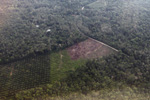
(03/17/2011) Indonesian environmental groups launched a urgent plea urging the country’s two largest pulp and paper companies not to clear 800,000 hectares of forest and peatland in their concessions in Sumatra. Eyes on the Forest, a coalition of Indonesian NGOs, released maps showing that Asia Pulp and Paper (APP) and Asia Pacific Resources International Limited (APRIL) control blocks of land representing 31 percent of the remaining forest in the province of Riau, one of Sumatra’s most forested provinces. Much of the forest lies on deep peat, which releases large of amount of carbon when drained and cleared for timber plantations.
Does chopping down rainforests for pulp and paper help alleviate poverty in Indonesia?

(01/13/2011) Over the past several years, Asia Pulp & Paper has engaged in a marketing campaign to represent its operations in Sumatra as socially and environmentally sustainable. APP and its agents maintain that industrial pulp and paper production — as practiced in Sumatra — does not result in deforestation, is carbon neutral, helps protect wildlife, and alleviates poverty. While a series of analyses and reports have shown most of these assertions to be false, the final claim has largely not been contested. But is conversion of lowland rainforests for pulp and paper really in Indonesia’s best economic interest?
Pulp plantations destroying Sumatra’s rainforests

(11/30/2010) Indonesia’s push to become the world’s largest supplier of palm oil and a major pulp and paper exporter has taken a heavy toll on the rainforests and peatlands of Sumatra, reveals a new assessment of the island’s forest cover by WWF. The assessment, based on analysis of satellite imagery, shows Sumatra has lost nearly half of its natural forest cover since 1985. The island’s forests were cleared and converted at a rate of 542,000 hectares, or 2.1 percent, per year. More than 80 percent of forest loss occurred in lowland areas, where the most biodiverse and carbon-dense ecosystems are found.
Asia Pulp & Paper fumbles response to deforestation allegations by Greenpeace

(09/28/2010) A new audit that seems to exonerate Asia Pulp & Paper from damaging logging practices in Indonesia was in fact conducted by the same people that are running its PR efforts, raising questions about the much maligned company’s commitment to cleaning up its operations. The audit slams Greenpeace, the activist group that accused Asia Pulp & Paper (APP) of illegal and destructive logging in Sumatra in its July 2010 report, How Sinar Mas is Pulping the Planet. It runs through each of the claims laid out in the Greenpeace report, arguing some are speculative or improperly cited. But the audit doesn’t actually deny that APP is clearing forests and peatlands for pulp plantations. In fact, the audit effectively confirms that the company is indeed engaged in conversion of ‘deep’ peat areas, but argues that this activity isn’t illegal under Indonesian law.